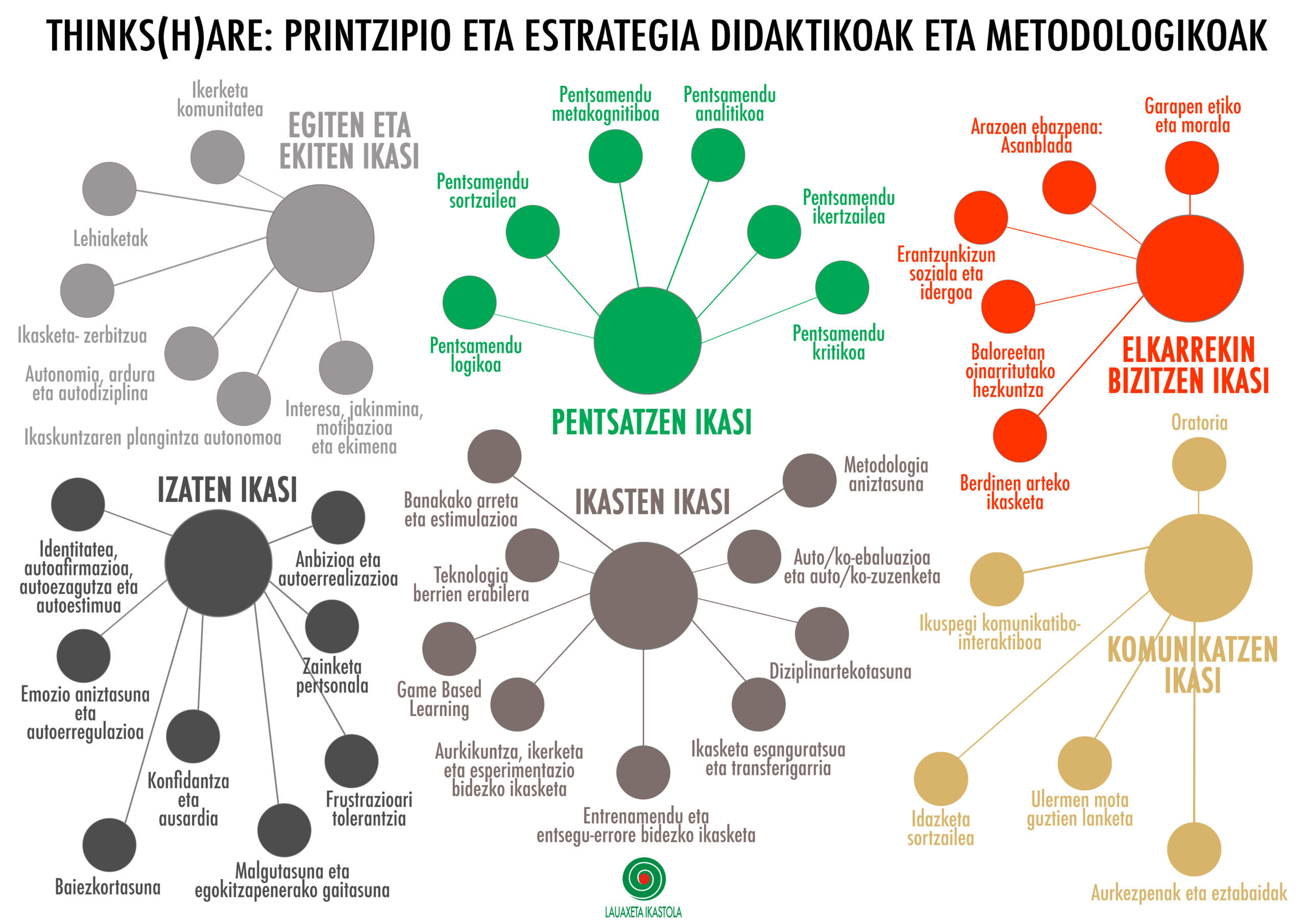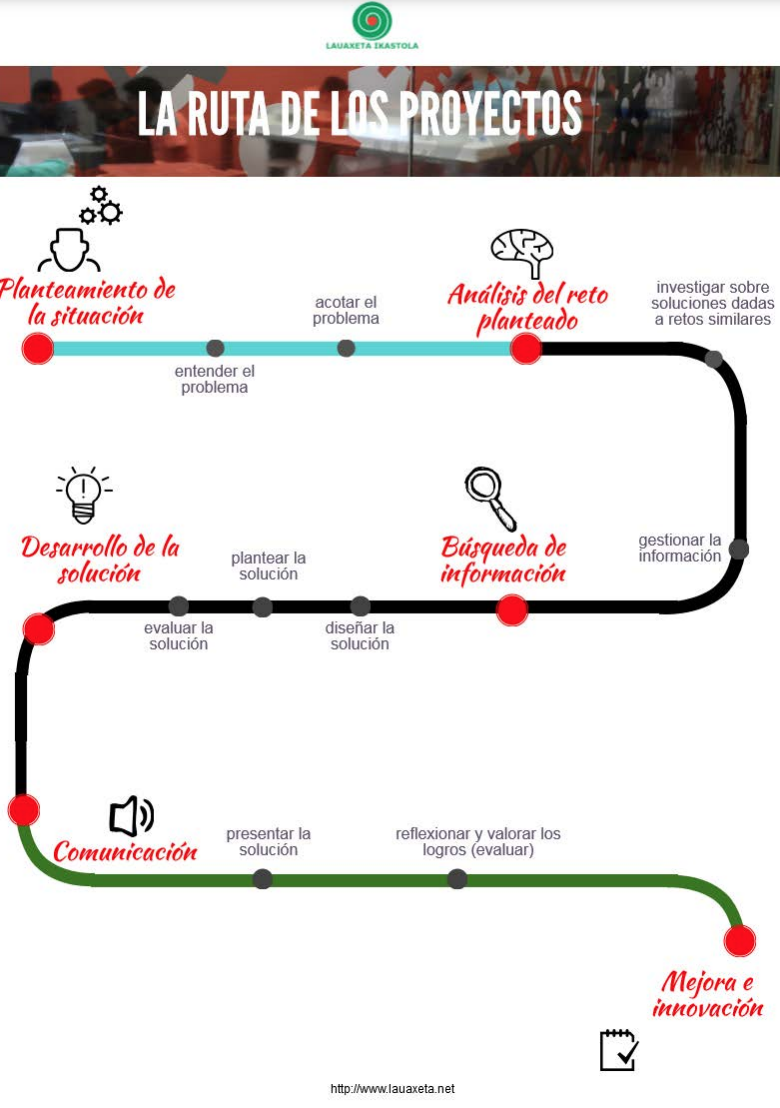0
You have 0 items in your cart
In accordance with our educational model, we work in an innovative way, attaching importance not only to the content or what is being taught but also, more particularly, to the procedures and methodologies, i.e. how it is taught, as this is the path to developing the students’ skills and abilities.
Continuous improvement is always our watchword, and all the teachers at the centre therefore form part of one of the Learning Communities, where they are involved in research, design and application of new methodologies for the classroom. These communities address different topics, which constantly change so that when the research and integration in the classroom are complete, new topics for innovation can be identified:
Multi-disciplinary Learning Units
These are inter-disciplinary projects of 1 or 2 weeks’ duration. They include different subjects and the aim is for the students to make their own reflections on a current issue and put forward ideas, applying what they have learnt in all the areas.
This methodology makes the projects more meaningful for the students, enhancing their learning possibilities and guiding them through a personal experience.
Problem-Based Learning
The students are given a situation or problem and have to find a solution using their knowledge and following different problem-solving stages. This methodology is deployed from from Pre-primary to Post-secondary, in a huge number of learning projects.
There are also approaches designed to be applied in everyday situations, so the students can make use of what they have learnt at the Ikastola in real life situations.

Cooperative Learning
The students learn collaboratively, which helps them develop their teamwork skills. They gain a suitable understanding of what cooperative work is and how to carry it out.
Teamwork is difficult, and it is hard for a group to play cooperatively. It is therefore important for the students to understand that teamwork is an attitude and an essential skill in today’s world, requiring the work and commitment of all the team members for it to succeed.
Assessment, rubrics and feedback
This work group focuses on a skills-based approach to education and programming and on competency-based assessment and feedback.
We often hear about the importance of soft skills, but how can we work on them and develop them in the students?
This work group researches the strategy for working on the different skills using the appropriate methodologies and techniques.
This is a work group that focuses on learning, teaching and using the Basque language at the ikastola.
How can we encourage young people to use the Basque language? How can we raise awareness that this language should be treasured by the Basque-speaking citizens and needs to be actively nurtured? How can we get people to love a language?
Apart from studying the teaching of the Basque language in depth, this work group coordinates awareness-raising actions at the ikastola connected with its emotional value.
Improving English teaching strategies and methodologies.
How do we work on a foreign language, if we consider it essential?
What kind of coordination actions do we have to carry out with the students to motivate them to learn this language even more?

The importance of coexistence with others and developing one’s personal space.
There cannot be a suitable atmosphere for learning if people cannot get along together, and it is therefore essential for the students to see and perceive the ikastola as a safe, comfortable space.
To ensure peaceful coexistence, one of the programmes developed is a relevant coordinated tutoring programme, and work is done to prevent bullying or similar situations within the framework of the KiVa programme.
A work group coordinating the Science, Technology, Engineering and Mathematics subjects.
How can we work on robotics with the students? And programming?
This is not a skill in itself but rather an area bringing different skills together, and this is the approach we use when working with the students.
Learning technologies
This is an inter-disciplinary group made up of teachers and professionals working in computers, communications and other areas, and it is responsible for coordinating the technology implementation.
ICTs are the path to achieving the ikastola’s educational goals, so it is vital that they work well and that we see them as our allies. We want to guarantee that the different options available are suitably used, benefiting from the opportunities they offer for learning process development.
Maths teaching coordination, including advanced secondary level (ESO) mathematics being offered to the students with more advanced maths skills.
Mathematics is one of the pillars of society and it can help students to understand many different aspects of society and nature, so it is very important for our students to have an open mind about this subject. We want them to strive towards the goal of improving society through mathematics.
A work group addressing the gender perspective and equality policies for the different people at the ikastola.
But how can we work on equality right through from pre-primary to post-compulsory secondary level? It is important to have suitable planning so that the students do not find this subject tedious. Emotion is the key. It is important for the students to assume and understand the importance of equality, realising it is vital to work towards achieving a better world in their lifetimes.
A work group that monitors and coordinates the ikastola’s commitment to society, working in accordance with the Sustainable Development Goals and coordinating the actions carried out in this area.
A large variety of activities take place over the year, some of them related to the natural environment and others to the social environment, and this work group coordinates all these actions.
It also manages the policies for the ikastola’s consumption of the different types of energy and for making it a more sustainable place.
These committees work on educational coordination and innovation, ensuring the correct coordination of the ikastola’s educational project as a whole and the success of all the projects, all the research and the other work groups.
This is the anti-bullying coordination team. Its aim is to guarantee the correct functioning of the various safety protocols.
KiVa is a work group made up of professionals from different educational stages, who collaborate with members of tutoring, coexistence and counselling groups.